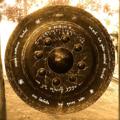I read this novel by accident. I looked it up after hearing about the dark forest hypothesis and I somehow missed the fact that this is the second book in a trilogy. I read the Three-Body Problem few years ago but didn't particularly like it. I found the same faults repeated in this novel too.
This book reads like a story from the science fiction's golden age: it has an interesting sci-fi concept at it's core, and it logically extrapolates from there. Cixin Liu does a really good job at this; at times it feels like Asimov's Foundation. Unlike the previous book, this one takes the plot into the farther future, and Liu gets to flex his creative muscle. The depiction of future cities and spaceships is well thought out and realistic. As a whole this book felt like reading through a game of chess.
Which leads me to the first of my objections: characters seem robotic. Even when they cite emotion as a factor in their decision-making process, this citation itself appears as a line in a logical proof. The characters just don't read as emotional beings.
The same "logic first" approach is applied to societies at large. As plot progresses through time we see countries taking actions which would fill entire novels seemingly "by decree". This simplifications feels like something Clarke would do, to help him explore an idea without getting lost in minutia of every-day reality. Unfortunately, it is this reality that makes for a more convincing story.
While these things are excusable as valid stylistic choices, and even necessary for Liu to tell the kind of story that he wants, my final qualm does not. It relates to portrayal of female characters.
There are few of them in the novel, the most prominent one being positioned squarely as a love interest of a male protagonist. What's worse, more pages have been devoted to his fantasizing about a "perfect woman" than to her actual character. When she does eventually appear it's because she has been kidnapped and brought as a some sort of a gift for the protagonist. She has been picked for this honor predominately based on her appearance. She is there for a chapter or two, in which time she falls in love with the protagonist, and is then kidnapped yet again and held as a hostage to ensure his cooperation. He proceeds to lament this turn of events until the end of the novel, but reflects on his fantasy more often than on the actual woman.
There is one more notable female character, and she is admittedly inflicted by fewer tropes. Although she too gets manipulated by another male protagonist, begrudges him at first, but then realizes the superiority of his idea and goes along with it. She ends up thinking of him as a fatherly figure.
All this seems fine to the rest of the characters and the narrator, and that is what makes it objectionable. It's one thing for a book to critique this treatment, or to omit it entirely. But the way it is presented here just feels wrong to me.










